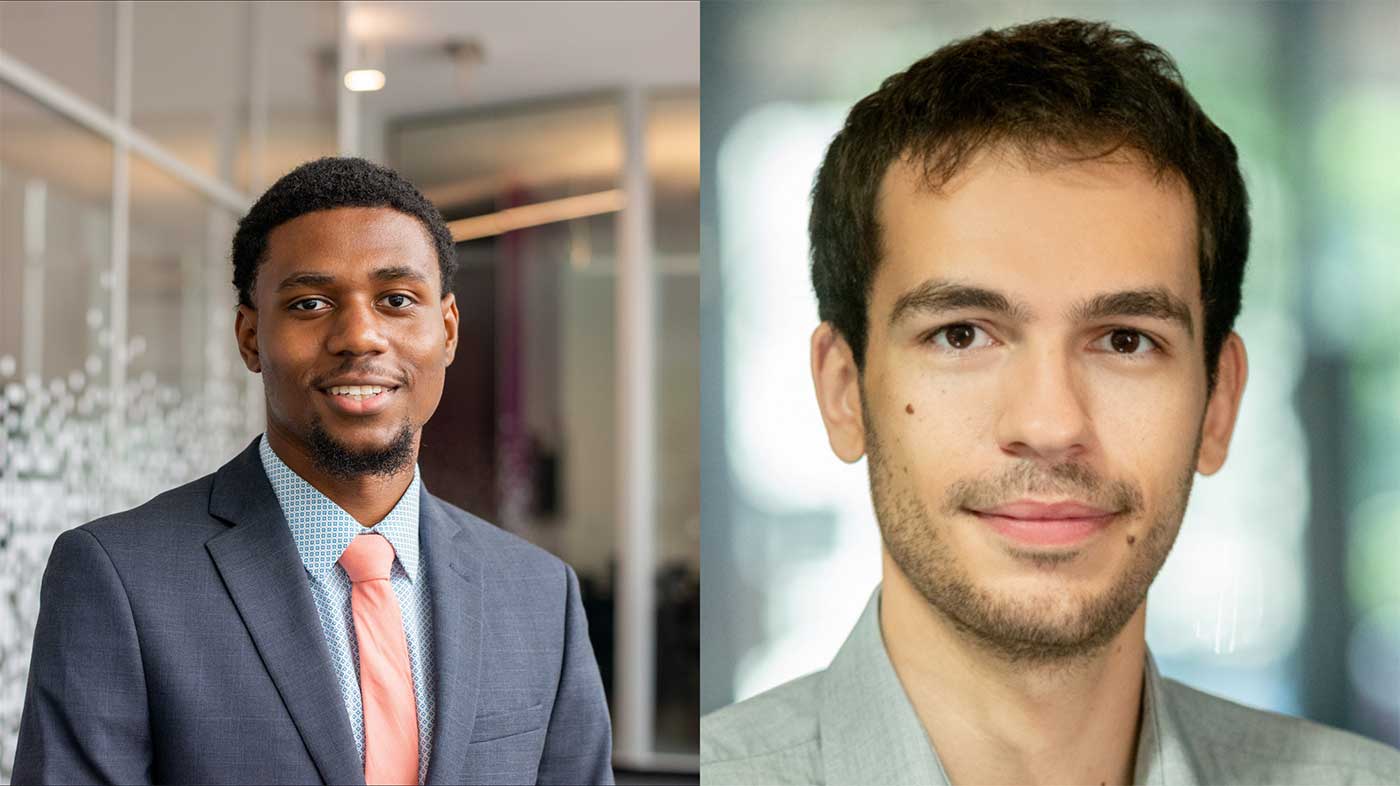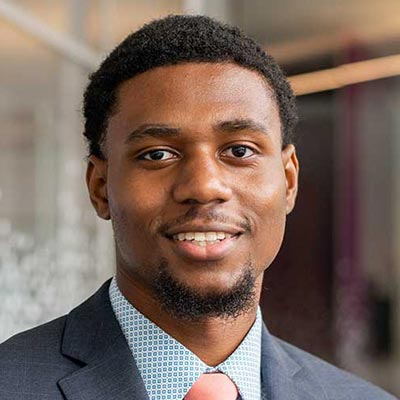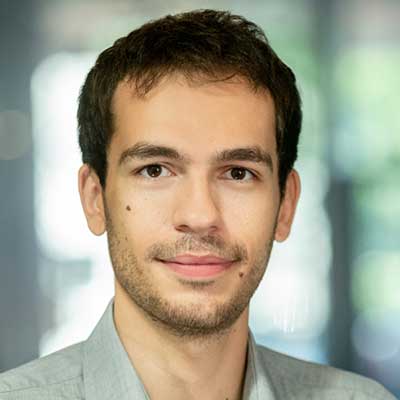Data students Amari Parris, Nikos Tziavelis earn GEM, Google fellowship honors
Author: Sarah Olender
Date: 10.23.23

Khoury College students take wildly different routes to Northeastern and to computer science. Graduate students Amari Parris and Nikos Tziavelis are no exception, with passionate stories and varied backgrounds that have led them from sports to technology research and everywhere in between. But while their backgrounds differ, the pair share one thing in common: they have both won prestigious fellowships to help them further their education.
Amari Parris: From kinesiology to Khoury College
After studying kinesiology at Morehouse College in Georgia as an undergraduate, Amari Parris decided that he was no longer passionate about his original career plans. For a while, he planned to become a physical therapist, but after finding a similar lack of excitement in the material, Parris started exploring other ways he could use his kinesiology degree.
“I ended up getting into tech and data science as a result of a sports analytics course I took at Morehouse in my junior year,” Parris said. “I really got interested in data-driven decision-making in sports and I just parlayed that into things that are more sports- and human-performance-focused, like sensors and wearable devices.”
Now Parris is pursuing his master’s in data science through Khoury College’s Align program, which allows students like Parris who come from noncomputing backgrounds to earn their master’s degrees in computing fields.

Once Parris realized he wanted to go back to school, he started researching ways to fund his education. One of his peers from Morehouse recommended he apply for the GEM Fellowship, which provides partial or full funding to master’s or doctoral students in STEM. The prestigious program also provides exposure to a variety of internship and networking opportunities.
Through the GEM Fellowship, Parris was matched with Genentech, a biotech company in San Francisco regarded as the first of its kind in the world. Parris worked as an intern in their small molecule pharmaceuticals department, and while the work wasn’t directly adjacent to his sports science passion, it still gave him a new perspective on research and a better idea of how he could combine his passions for data and kinesiology into a career.
“I’m not much of a chemist, so it wasn’t for me, but I did enjoy the company, and I think there are other roles at the company that I’d be interested in,” Parris said. “It was a challenging experience, but I appreciated the opportunity because it really helped me see this is what I want to do, this is everything that I possibly can do from visualization to developing and maintaining models, and then presenting those to stakeholders.”
Parris still plans to go into the biotech space, but with a semester and change left in his master’s journey, he plans to take advantage of all the resources Khoury College has to offer.
“It’s really cool to have a ton of different things that you’re interested in right at your fingertips,” he said. “There are sports science labs, biomechanics labs, hackathons, and special interest groups that constantly bring in companies to talk about the things that you’re interested in … It’s a really cool opportunity to build the career that you want because you have access to so many different things and avenues.”
Nikos Tziavelis: creativity, databases, and a Google fellowship
During his last undergraduate year in electrical and computer engineering at the National Technical University in Athens, Greece, Nikos Tziavelis was exposed to the world of tech research.
“I really loved research and I wanted to continue doing it,” he said of the decision to pursue his PhD in database management at Khoury College, over 4,000 miles from his home country.

Now in the fifth year of his transatlantic PhD journey, Tziavelis has enjoyed the creative endeavor, which requires him to think outside the box and come up with unique solutions.
“I think it really differs from other stuff that you can do in tech,” he said, citing the inherently entrepreneurial atmosphere of technology research. “You can really develop your own ideas. You can have leadership. I think it’s similar to doing a startup, just without the risks.”
Tziavelis recently won the prestigious Google PhD Fellowship, which supports PhD candidates in their research journeys. This support comes through different avenues, including a mentor to offer support and wisdom, as well as financial support to cover tuition and living expenses.
Tziavelis is grateful to his advisors, Professors Wolfgang Gatterbauer and Mirek Riedewald, for their assistance along the way.
“Not only did they provide scientific guidance and support, but they also encouraged me to take on more and more of a leadership role — both scientifically and in our Khoury College community,” he said.
Tziavelis put in a lot of work to earn the fellowship, and his resume shows it. He has published papers throughout his PhD candidacy, all of them emphasizing the creation of more efficient databases and solving problems that arise in the foundations of data systems. In one such paper on “any-k algorithms,” Tziavelis helped craft a database that manages information and delivers it to users promptly and efficiently, all without making the users sort through complex algorithms.
To create that database, Tziavelis didn’t just build a new system. He had to reconfigure the algorithms that any particular database uses, which created a database that orders faster than even some commercial database systems used today, according to Tziavelis.
In addition to this work, he also has given tutorials on these ideas — tutorials which are available online. He made one about his any-k algorithm paper, which also extends to his work with responsive DBMS.
“The fellowship is definitely a big recognition of the work that I’ve been doing together with my advisors and collaborators and I’m very honored to receive that,” Tziavelis said. And as he nears the end of his candidacy and prepares to defend his thesis, he’s reflecting not just on the fellowship’s importance, resources, and opportunity, but also on what it says about his future.
“It gives me confidence,” he said. “That’s the biggest thing. It gives me confidence to pursue my next moves.”
Subscribe to Khoury News
The Khoury Network: Be in the know
Subscribe now to our monthly newsletter for the latest stories and achievements of our students and faculty